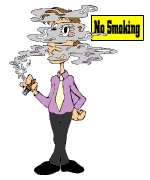also known as World No Tobbaco Day
31st May


The contribution of tobacco to death and disease is well documented. Less attention is given to the ways in which tobacco increases poverty.
Tobacco is the fourth most common risk factor for disease worldwide. The economic costs of tobacco use are equally devastating. In addition to the high public health costs of treating tobacco-caused diseases, tobacco kills people at the height of their productivity, depriving families of breadwinners and nations of a healthy workforce. Tobacco users are also less productive while they are alive due to increased sickness. A 1994 report estimated that the use of tobacco resulted in an annual global net loss of US$ 200 thousand million, a third of this loss being in developing countries.
![]() SUSSEX, U.K., March 26,
2001: Smoking will become the biggest killer in developing world countries
within the next 20 years, surpassing those deaths caused by the Aids epidemic
according to the Institute of Development Studies in Sussex, UK's government-
based study. The report forecasts that within two decades 8.5 million people
a year will be dying in developing countries because of smoking. A billion
people around the world are currently smokers, and tobacco-related illness
currently kills 3.5 million a year. At the moment it is mainly a rich country
disease, but the report says this is changing fast. The report says the
increasing process of globalization will be partly to blame as developing
countries are forced to drop tariff barriers against highly successful
international brands and that many governments are seduced by the inward
investment this brings, but have not realized the long-term cost in human
lives.
SUSSEX, U.K., March 26,
2001: Smoking will become the biggest killer in developing world countries
within the next 20 years, surpassing those deaths caused by the Aids epidemic
according to the Institute of Development Studies in Sussex, UK's government-
based study. The report forecasts that within two decades 8.5 million people
a year will be dying in developing countries because of smoking. A billion
people around the world are currently smokers, and tobacco-related illness
currently kills 3.5 million a year. At the moment it is mainly a rich country
disease, but the report says this is changing fast. The report says the
increasing process of globalization will be partly to blame as developing
countries are forced to drop tariff barriers against highly successful
international brands and that many governments are seduced by the inward
investment this brings, but have not realized the long-term cost in human
lives.![]()
![]()
Content may be reproduced, provided proper credit is given to
http://www.HinduismToday.com/
Source: "Smoker's Pet," by Julia Szabo, 3/7/04, NY Post (Reprinted for educational purposes only)
Of all the compelling reasons to quit smoking, this one should make pet lovers sit up and take notice: there's ample scientific evidence to suggest that secondhand cigarette smoke can cause cancer in companion animals.
And your furry friends don't just inhale smoke; the smoke particles are also trapped in their fur and ingested when they groom themselves with their tongues.
West Village resident Cynthia Garnant has been smoking for 25 years, and currently goes through a pack of Now 100s a day.
She and her non-smoking husband, Greg, share four cats: Mahogany, Barney, Tig, and Titania. And she has no immediate plans to kick her longstanding habit.
None of the couple's cats has displayed smoke-related health issues, Garnant says. "Mahogany has kidney problems and Barney's thyroid levels are elevated," she points out, "but these are symptoms of age, not secondhand smoke."
Still, she adds, "I smoke only in the living room, where we have three air filters. I never smoke in the bedroom, which is the cats' favorite place to hang out."
A study published in the American Journal of Epidemiology found that dogs in smoking households had a 60 percent greater risk of lung cancer; a different study published in the same journal showed that long-nosed dogs, such as collies or greyhounds, were twice as likely to develop nasal cancer if they lived with smokers.
And in yet another study, vets from Tufts University found that cats whose owners smoked were three times as likely to develop lymphoma, the most common feline cancer.
So - short of kicking the habit - Garnant and her husband take three of the cats to the vet at least twice a year for checkups; the fourth, Barney, goes every three months.
"All of our cats are rescues," Garnant concludes. "If they had the choice between being living in this apartment and staying at a shelter, where they could possibly be put to sleep, I think they'd choose the first option."
Courtesy of {The Animal Spirit Newsletter} Issue 3/8/04-3/14/04
http://www.theanimalspirit.com
NEW DELHI, INDIA, May 1, 2004: In a major public health measure, the ban on smoking in public places, direct and indirect advertising of all tobacco products and their sale to minors came into force on Saturday in the country under the Anti-smoking Act. Government is also working on other aspects of the Act like prohibition of sale of tobacco products near educational institutions, mandatory depiction of statutory warning including pictorial warning on tobacco products and mandatory depiction of tar and nicotine content, Health Ministry officials told PTI. These rules are likely to be ready in three months, but Government would give some time to the industry before they actually come into force, they said.
"State Governments have been asked to authorise people to implement the new provisions that came into force," the officials said. There is a provision of US$4.00 fine for punishment for people who violate the rules and smoke in public places, they said. The order defines public places as enclosed areas like restaurants, offices, railway waiting rooms, buses, airports etc.
Courtesy of http://www.HinduismToday.com/


Options for quitting smoking completely:

http://www.smokefreeforever.com/
Dr. Hayes-Bohanan's Smoke-Free Zone
http://webhost.bridgew.edu/jhayesboh/nosmoke/

Discreet, Plain Boxed, Super-fast WORLDWIDE Priority Shipping. Arriving
just days after you order
http://www.help-quit-smoking-stop-smoking-quitting-aids.com/
7
steps to stopping smoking !!!!
http://www.lungusa.org/site/pp.asp?c=dvLUK9O0E&b=41806